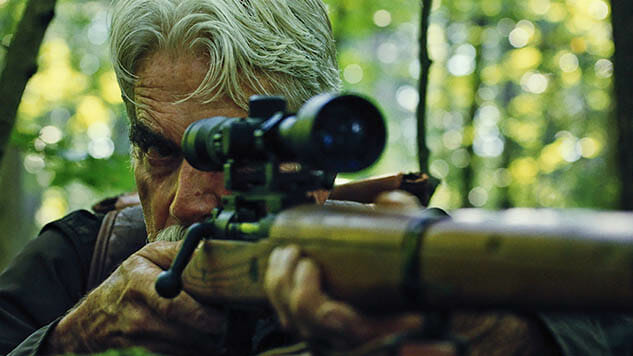The Man Who Killed Hitler and Then the Bigfoot
Images via RLJE Films
What’s it worth to you to witness Oscar nominee Sam Elliott covered, iconic mustache dripping, with projectile Bigfoot vomit? The success of The Man Who Killed Hitler and Then the Bigfoot hinges on such fantasies you never thought you harbored until you heard about them, such fantasies as a well-respected actor playing a man who first killed Hitler and then later, in his twilight years amidst the everpresent shadows of a lifetime of regret, killed the Bigfoot. Sam Elliott is Calvin Barr, the man who killed Hitler and then the Bigfoot, who in between got a dog and befriended the local barkeep and roughed up a few small town ne’er-do-wells. This is The Man Who Killed Hitler and Then the Bigfoot. It stars Oscar nominee Sam Elliott.
Calvin Barr spends his evenings drinking at an empty bar then falling asleep in front of an ancient cathode ray tube TV, his mornings taking old man pills with a modest breakfast then asking his dog what they’re going to do that day until it’s time to go back to the bar. One night, his routine’s upended when he’s accosted by some thugs, whom he efficiently dispatches with the hand-to-hand combat training of a man who probably killed Hitler and might later kill the Bigfoot. This scuffle, one very brief action scene in a film with a dearth of action scenes, awakens vivid memories of not only the time he killed Hitler, but of his courtship to a pretty school teacher he planned to marry had he not gone to war, where he’d eventually kill Hitler. This welling up of lost chances stymies the elderly Barr, to the point that he, the film implies, considers suicide, taking out his decorated uniform as if he’s preparing to dress up one last time, thinking better of it and returning the outfit back into his closet. His mundane quotidian resets; he leaves with his dog, a leash and suffocating loneliness to take yet another walk downtown.
Writer-director Robert D. Krzykowski, this being his feature length debut, appears to be attempting a quiet melange of genres he loves to get into the headspace of Calvin Barr—mixing up ’70s grindhouse, historical melodrama and epic Spielbergian sci-fi with an impressive grasp on tone—but the fact that he seems to have no reason to combine them, no anchoring conceit, means that even the most arresting images inevitably slip away under non-sensical plot and ponderous bait-and-switch. The Man Who Killed Hitler and Then the Bigfoot is an exquisitely boring movie, a promise of high-concept adventure that only delivers a stiflingly melancholy ode to the unknown soldier. Barr must live with what he’s done, and that simply is that; his only reward is being conscripted into an operation to, yes, kill the Bigfoot, who apparently carries a doomsday virus that only Barr is immune to.
-

-

-

-

-

-

-

-

-

-

-

-

-

-

-

-

-

-

-

-

-

-

-

-

-

-

-

-

-

-

-

-

-

-

-

-

-

-

-

-








































